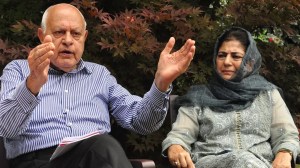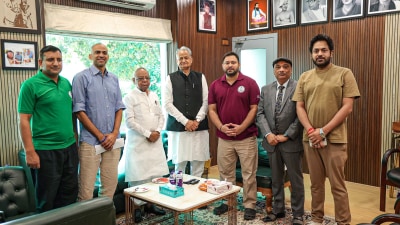AFTER A decade of absolute domination, the BJP has fallen short of a majority in the Lok Sabha elections, leading the party under Narendra Modi into new political territory with its main NDA allies emerging as key players in the ruling alignment.
The NDA is still on course to form the Government but it will be dependent on alliance partners TDP and JD(U), who may not hesitate to review their support if they disagree with the BJP at crucial junctures on the road ahead — especially on hot-button issues such as simultaneous polls, delimitation and a uniform civil code.

More so, because both TDP chief N Chandrababu Naidu and JD(U)’s Nitish Kumar have had tumultuous ties with the BJP in the past. “There is no scope for any drastic reform policies, be it in the social sector or in the economic sector, in a coalition government. For example, parties like the JD(U) will not support the divestment of PSUs,” a BJP leader and former Union minister told The Indian Express.
Story continues below this ad
In 2018, the TDP broke its alliance with the BJP, after having been part of the Modi-led Government, over Andhra Pradesh not receiving special category status. Their ties had soured so much that Naidu even described Modi as “a hardcore terrorist”. Later, despite Naidu’s repeated attempts to revive their ties after the 2019 Lok Sabha elections, the BJP dragged its feet over allowing his party back into the NDA.
Bihar Chief Minister Nitish Kumar, who was part of the A B Vajpayee government, had first snapped the JD(U)’s ties with the BJP in 2014, objecting to its move to declare Modi as its prime ministerial candidate. Although he returned to the NDA fold later, he again snapped ties in 2022 to form the state government with the RJD and Congress, only to return earlier this year.
Now, with the JD(U) performing better than the BJP in Bihar in terms of strike rate, Kumar could “act pricey” again with the BJP, according to a BJP MP from the state. As counting progressed late Tuesday, the BJP was leading in 12 of the 17 seats it contested while Kumar’s party had a clear lead in 14 of the 16 seats it fought from.
According to political observers, with Modi’s image of invincibility dented, at a time when the BJP has centered its politics and electioneering strategy around him, it remains to be seen whether he would be able to survive as the prime minister of a coalition government. Crucially, senior BJP leaders admit, a coalition government would mean that many of the BJP’s pet projects, both in reforms as well as on the ideological front, are shelved or kept in cold storage.
Story continues below this ad
While the new Government was expected to prepare for simultaneous elections under the tagline of “One Nation One Poll”, one of the favourite projects of Modi himself, the new combination in power may not be favourable for any such move. For instance, the TDP is not believed to be in favour of the plan while the JD(U) had supported it while responding to the Ram Nath Kovind-led panel that recommended simultaneous polls and ways to roll it out. Then again, the 15 parties that opposed the move included the Congress, TMC, DMK, AAP and SP, which together now form a formidable and emboldened opposition that, observers say, would ensure long-awaited checks and balances in national politics.
The BJP may also be forced to change its perspective on the delimitation process, due in 2026, depending on the position taken by the TDP. During the 2024 campaign, Union Home Minister Amit Shah had categorically said that the process would take place in the scheduled time period.
Besides, Tuesday’s results, especially from UP where the BJP’s tally has almost halved from the 2019 tally of 62, indicates there could be pressure from within the party to go slow on the women’s reservation bill, which it had pushed through in a specially convened Parliament session last September.
Party leaders also point out that with the much-hyped Ram Temple “pran pratishta” not yielding any big dividend for the BJP, even in UP, the party would be forced to put on the backburner its contentious agenda on other disputed religious sites in Kashi and Mathura.
Story continues below this ad
Although the party has maintained that the matter would be left to the courts, many leaders including Assam Chief Minister Himanta Biswa Sarma had suggested that the Muslim community should relocate Mathura’s Shahi Eidgah and Varanasi’s Gyanvapi mosque to other sites through “mutual consultations”.
Similarly, a beginning had been made towards a uniform civil code, with BJP-ruled Uttarakhand implementing it and other states ruled by the party set to follow suit. However, given the possible equations in the next Lok Sabha, the BJP may remove this plan also from its list of national priorities.
Despite its impressive performance in Delhi, the overall results could force the BJP to also tone down its attempts to corner the AAP in Delhi with the debate over the Constitutional crisis between the state and centre taking a backseat.
According to leaders, the political composition of the 18th Lok Sabha may also force the Central Government to expedite the process of restoring statehood to Jammu and Kashmir.









